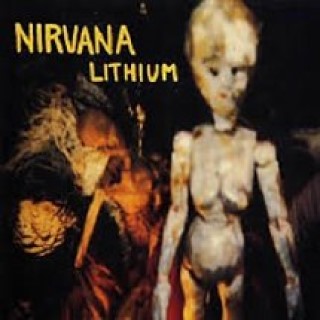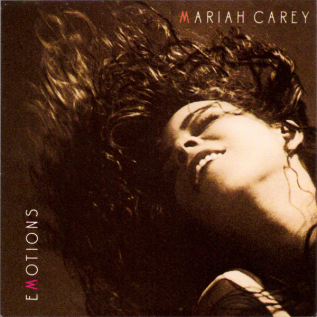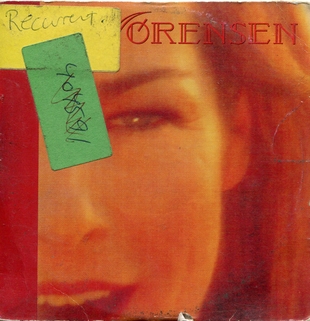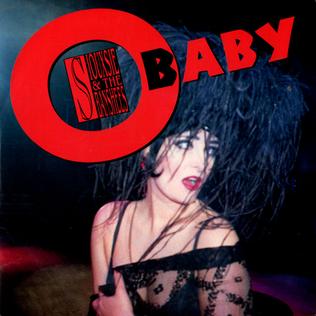
"I'll Be There for You" is a song by American pop rock duo the Rembrandts. The song was written by David Crane, Marta Kauffman, Michael Skloff, and Allee Willis as the main theme song to the NBC sitcom Friends, which was broadcast from 1994 to 2004. American rock band R.E.M. was originally asked to allow their song "Shiny Happy People" to be used for the Friends theme, but they turned the opportunity down. "I'll Be There for You" was subsequently written and Warner Bros. Television selected the only available band on Warner Bros. Records to record it: the Rembrandts. In 1995, after a Nashville radio station brought the song to mainstream popularity, Rembrandts members Danny Wilde and Phil Sōlem expanded the theme song with two new verses and included this version on their third studio album, L.P. (1995).

"Lithium" is a song by the American rock band Nirvana, written by vocalist and guitarist Kurt Cobain. It appears as the fifth track on the band's second album Nevermind, released by DGC Records in September 1991.

"Until It Sleeps" is a song by American heavy metal band Metallica, released on May 20, 1996, as the lead single from their sixth studio album Load. "Until It Sleeps" reached number ten on the Billboard Hot 100 making it Metallica's highest charting single and only top ten hit in the United States. The song was also their first number-one on the Billboard Hot Mainstream Rock Tracks chart, peaked in the top five in the United Kingdom, and reached number-one in Australia, Denmark, Finland, Hungary, and Sweden. The song's music video, directed by Samuel Bayer and inspired by the paintings of Hieronymus Bosch, won the Best Hard Rock Video award at the 1996 MTV Video Music Awards.

"I'll Be There" is the first single released from Third Album by The Jackson 5. It was written by Berry Gordy, Hal Davis, Bob West, and Willie Hutch.

"Can't Let Go" is a song by American singer-songwriter Mariah Carey from her second studio album, Emotions (1991). It was released as the album's second single on October 23, 1991, by Columbia Records in the United States and the first quarter of 1992 elsewhere. It was written and produced by Carey and Walter Afanasieff. The protagonist of this synthesizer-heavy ballad laments an ex-lover who has moved on, and though she tries she "can't let go."

"Emotions" is a song recorded by American singer-songwriter Mariah Carey for her second studio album of the same name (1991). It was written and produced by Carey, Robert Clivillés, and David Cole of C+C Music Factory and released as the album's lead single on August 13, 1991 by Columbia Records. The song's lyrics has its protagonist going through a variety of emotions from high to low, up to the point where she declares, "You got me feeling emotions." Musically, it is a gospel and R&B song heavily influenced by 1970s disco music and showcases Carey's upper range and extensive use of the whistle register. Jeff Preiss directed the song's music video.

"Someday" is a song by American singer and songwriter Mariah Carey from her self-titled debut studio album (1990). It is a dance-pop, new jack swing and R&B song. Prior to Carey signing a record contract, she and producer Ben Margulies had written and produced a four-track demo which included "Someday". After signing a contract with Columbia Records, Carey began work on her debut album and she reached out to Ric Wake to ask if he would produce the song, to which he agreed. The composition of the demo recording was changed during the recording process, most notably replacing the horns with a guitar, which Carey disapproved of.

"Fantasy" is a song by the American singer-songwriter Mariah Carey. It was released on August 23, 1995, by Columbia Records as the lead single from her fifth album, Daydream (1995). The track was written and produced by Carey and Dave Hall. It samples Tom Tom Club's 1981 song "Genius of Love". The lyrics describe a woman who is in love with a man, and how every time she sees him she starts fantasizing about an impossible relationship with him. The remix for the song features rap verses from Ol' Dirty Bastard, something Carey arranged to assist in her crossover into the hip-hop market and credited for introducing R&B and hip hop collaboration into mainstream pop culture, and for popularizing rap as a featuring act.

"(Everything I Do) I Do It for You" is a song by Canadian singer-songwriter Bryan Adams. Written by Adams, Michael Kamen, and Robert John "Mutt" Lange, the power ballad was the lead single for both the soundtrack album from the 1991 film Robin Hood: Prince of Thieves and Adams's sixth studio album, Waking Up the Neighbours (1991). The single was released on June 17, 1991.

The discography of Nirvana, an American rock band, consists of three studio albums, twenty-one singles, five live albums, two extended plays, four compilation albums, and three box sets.

The Dutch Top 40 is a weekly music chart compiled by Stichting Nederlandse Top 40. It started as a radio program titled "Veronica Top 40", on the offshore station Radio Veronica in 1965. It remained "The Veronica Top 40" until 1974, when the station was forced to stop broadcasting. Joost den Draaijer initiated the Top 40 in the Netherlands. The show currently airs on Fridays from 2 to 6 PM on Qmusic.

"Torn" is a song written by Scott Cutler, Anne Preven, and Phil Thornalley. It was first recorded in 1993 in Danish by Danish singer Lis Sørensen, then in 1995 by Cutler and Preven's American rock band Ednaswap, and in 1996 by American-Norwegian singer Trine Rein.

"O Baby" is a song written and recorded by English rock band Siouxsie and the Banshees. It was produced by John Cale and released as the first single from the band's 11th studio album, The Rapture. Melody Maker wrote : "O Baby is the wonderful prelude to Rapture" and it is "deliciously pop".

"How Bizarre" is a song written and performed by New Zealand musical group OMC. It was released in December 1995 as the lead single from their album How Bizarre and went on to top the charts of five countries: Australia, Austria, Canada, Ireland and New Zealand. Outside New Zealand, OMC is generally considered a one-hit wonder; they had a further few successful singles in New Zealand, including "On the Run" and "Land of Plenty".

Canadian singer Celine Dion has released 137 singles in both English and French discography as a lead artist. According to Billboard magazine, Dion is the world's best-selling contemporary female artist of all time. As of 2021, she has reportedly sold around 200 to 250 million records worldwide. Referred to as the "Queen of Power Ballads", Dion has released a string of worldwide hits, with "My Heart Will Go On" being her career's biggest hit, with estimated physical sales of over 18 million worldwide, making it the 2nd best-selling physical single by a woman in history. It reached over 117 million radio impressions during its peak, becoming the most-played radio hit in history and became the best-selling single of 1998 worldwide. "Because You Loved Me" is her biggest hit on the US Billboard Hot 100, spending six weeks atop the chart and selling six million copies in its first six months of availability worldwide. "Pour que tu m'aimes encore" was the 4th biggest hit of the 1990s in France and has sold over four million copies worldwide.

"Save Tonight" is a song written and performed by Swedish rock musician Eagle-Eye Cherry, released on 7 October 1997 as the lead single from his debut album, Desireless (1997). It is the album's opening track and gained substantial radio success, reaching number three in Ireland, number five in the United States, number six in the United Kingdom, and number two in Cherry's native Sweden. It was voted song of the year by New Zealand radio station The Edge. "Save Tonight" was awarded the Rockbjörnen award in the "Swedish song of the year 1997" category.
Hitlisten, also known as Tracklisten, is a Danish top 40 record chart that is updated every Wednesday at midnight on the website hitlisten.nu. The weekly Danish singles chart combines the 40 best-selling tracks from streaming and legal music downloads. The Danish albums chart combines downloads, streaming and also sales of CDs. There is a separate vinyl chart. The data is collected by Nielsen Music Control, who also compile the chart on behalf of IFPI.

The discography of Swedish pop duo Roxette consists of ten studio albums, one live album, thirteen compilation albums, one remix album, eleven video albums, three box sets, fifty-six singles and twenty promotional singles, as well as fifty-two music videos. The duo, which consisted of Per Gessle and Marie Fredriksson, are the second most commercially successful Swedish act of all time, after ABBA. They sold over 75 million records worldwide, although a report by the Los Angeles Times put the figure as high as 80 million. The RIAA awarded them certifications of 3.5 million units in the US, where the duo have sold over two million albums since Nielsen SoundScan began tracking sales data in May 1991. The BPI in the UK certified Roxette for shipments of at least 3 million. They were particularly successful in Germany, where they are recognised as one of the highest-certified acts of all time, with shipments of 5.725 million units.
The Media Research Information Bureau (MRIB) was a music chart research company that operated in the United Kingdom from 1981 to 2008. It was best known for compiling the chart data for The Network Chart Show which was broadcast by many TV and radio shows, as well as being published in many music newspapers and magazines. MRIB also compiled other genre charts for the United Kingdom.



























